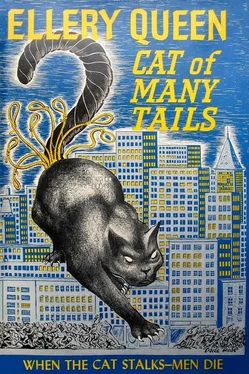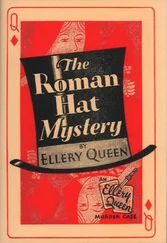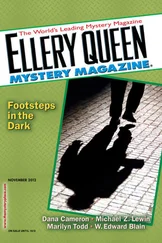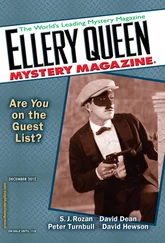On New Year’s Day.
Where was Professor Seligmann?
Ellery began to worry about the Viennese fuel situation. He had a frostbitten recollection of engine trouble, a forced landing after tumbling over and over among the stars like a passenger on a space ship out of control, and a miserable railway train; but his chief memory was of the cold. As far as Ellery could make out, Europe was in the Second Ice Age; and he fully expected to locate Professor Seligmann imbedded in the heart of a glacier, like a Siberian mastodon, in a perfect state of preservation. He had telephoned Seligmann from Rome, giving the old man such information as he had had about his Italian plane’s scheduled arrival. But he had not foreseen the journey through outer space and the groaning aftermath of the miserable train. Seligmann was probably getting pneumonia at... which airfield had that been?
The hell with it.
Two figures approached, crunching the icy platform. But one was a saber-toothed porter and the other a Schwester of some Austrian Roman Catholic order and neither satisfied Ellery’s conception of a world-famous psychoanalyst.
The Schwester hurried the little Italian priest away and the saber-toothed porter came dashing up, full of colloquialisms and bad breath. Ellery found himself engaged in a battle of unconquerable tongues. Finally he left his bag in the fellow’s charge, although not with confidence; the porter looked exactly like Heinrich Himmler. And he went sleuthing for a telephone. An excited female voice answered. “Herr Kavine? But is not Herr Professor with you? Ach, he will die in the cold! He must meet you. You are to wait, Herr Kavine, to wait where you are. Westbahnhof? Herr Professor will find you. He said it!”
“Bitte schön,” muttered Herr Kavine, feeling like Landru; and he returned to the platform and the glacial epoch. And waited again, stamping, blowing on his fingers, and catching only every fifth word of the porter’s. Probably the coldest winter Austria’s had in seventy-nine years, he thought. It always is. Where was the Föhn, that lecherous Lurleian breeze from the Austrian Alps which reputedly caressed the jeweled hair of Danube’s Queen? Gone, gone with all the winds of myth and fantasy. Gone with Wiener Blut, leichtes Blut, now a sullen mass of crimson icicles; gone with the Frühlingsstimmen, the spring voices, stilled by the throttling winter and the shrilling of boys crying the postwar Morgenblätter, such as they were; gone with the Geschichten aus dem Wiener Wald, now tales imprisoned in an antique musicbox which was forever broken... Ellery shivered, stamped, and blew as the disguised Himmler whined to him about die guten, alten Zeiten.
In the gas chambers, Ellery thought unreasonably. Tell it to Hitler, he thought.
An der schönen, blauen Donau ...
Ellery kept his refrigerated feet pumping and blew pfuis on the whole postwar European world.
Professor Seligmann came along at a little after 10 o’clock. The mere sight of that huge body, made huger by the black sheeplined greatcoat collared with Persian lamb and topped with a Russian-style bashlyk, was thawing; and when he took one of Ellery’s disembodied members in his great, dry, warm hands Ellery melted to the inner man. It was like wandering lost over the earth and coming unexpectedly upon the grandfather of your tribe. The place did not matter; where the patriarch was, there was home. Ellery was struck by Seligmann’s eyes particularly. In the lava of that massive face they were eternal fumaroles.
He barely noticed the changes in the Karlsplatz and on the Mariahilferstrasse as they rode in the psychoanalyst’s ancient Fiat, driven by a scholarly looking chauffeur, into the Inner City through toppling streets toward the Universität district where the old man lived. He was too agreeably occupied in warming himself at his host.
“You find Vienna not as you expected?” asked Professor Seligmann suddenly.
Ellery started; he had been trying to ignore the shattered city. “It’s been so many years since I was here last, Herr Professor. Since long before the War—”
“And the Peace,” said the old man with a smile. “We must not overlook the Peace, Mr. Queen. Those difficult Russians, nyet? Not to mention those difficult English, those difficult French, and — bitte schön — those difficult Americans. Still, with our traditional Schlamperei, we manage to drag along. After the first War there was a song popular in Vienna which went, ‘Es war einmal ein Walzer; es war einmal ein Wien.’ And we survived. Now we are singing it again, when we do not sing ‘Stille Nacht, heilige Nacht.’ Everywhere in Vienna people are speaking of die guten, alten Zeiten. How do you say this? ‘The good old days.’ We Viennese swim in nostalgia, which has a high saline content; that is how we remain afloat. Tell me about New York, Herr Queen. I have not visited your great city since 1927.”
Ellery, who had flown an ocean and crisscrossed half a continent to talk about something else, found himself giving a Times Square sightseeing busman’s description of postwar Manhattan. And as he talked his sense of time, numbed by his hyperborean flight, began to revive and tick away; and he experienced the shock of recognition, as if this — now — were something very old insisting in a flash on being re-experienced. Tomorrow the trial of Edward Cazalis began and here he was, gossiping with a very old man over four thousand miles away by any route. A pulse began to clamor, and Ellery fell silent as the car drew up before a shellpocked apartment building on some broad Strasse whose name he had not even bothered to watch for.
Frau Bauer, Professor Seligmann’s housekeeper, greeted her aged employer with aspirin, tea, a hot-water bag, and imprecation — and Ellery with a reminiscent frigidity; but the old man brushed her aside with a smiling “Ruhe!” and led Ellery by the hand, like a child, into the land of Gemütlichkeit.
Here, in Seligmann’s study, were the best of the grace and charming intelligence of Alt Wien. The decor was twinkly with wit; it had animation, a leisurely joyousness, and it was a little sly in a friendly way. Here the self-conscious new did not intrude; there was nothing of Prussian precision; things had a patina, they were fine and they glowed.
Like the fire. Oh, the fire. Ellery sat in the lap of a motherly chair and he felt life. And when Frau Bauer served a starving man’s breakfast, complete to melting, wonderful Kaffee-kuchen and pots of rich and aromatic coffee, he knew he was dreaming.
“The best coffee in the world,” Ellery said to his host, raising his second cup. “One of the few national advertising claims with the merit of exact truth.”
“The coffee, like almost everything else Elsa has served you, comes to me from friends in the United States.” At Ellery’s blush Seligmann chuckled. “Forgive me, Herr Queen, I am an old Schuft, as we say, a scoundrel. You have not crossed an ocean to indulge in my bad manners.” He said evenly, “What is this now about my Edward Cazalis?”
So here it was.
Ellery left the motherly chair to stand before the fire like a man.
He said: “You saw Cazalis in Zurich in June, Professor Seligmann. Have you heard from him since?”
“No.”
“Then you don’t know what’s been going on in New York this summer and fall?”
“Life. And death.”
“I beg pardon?”
The old man smiled. “I assume it, Mr. Queen. Has it not always? I do not read newspapers since the war begins. That is for people who like to suffer. I, I do not like to suffer. I have surrendered myself to eternity. For me there is today this room, tomorrow cremation, unless the authorities cannot agree to allow it, in which case they may stuff me and place me in the clock tower of the Rathaus and I shall keep reminding them of the time. Why do you ask?”
Читать дальше












